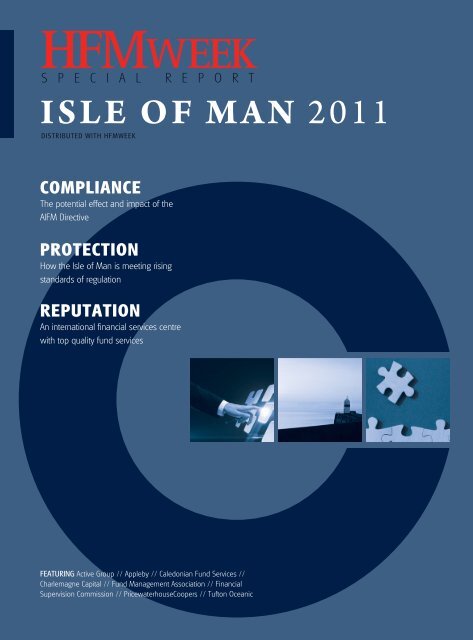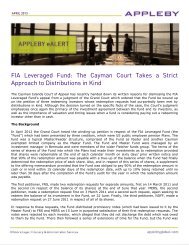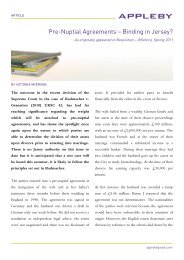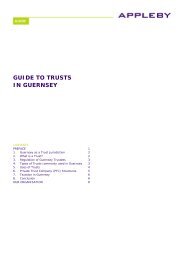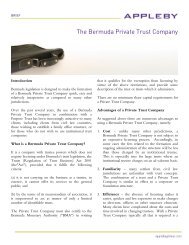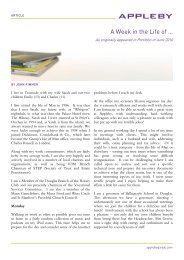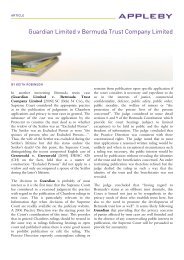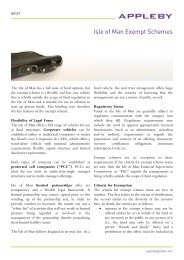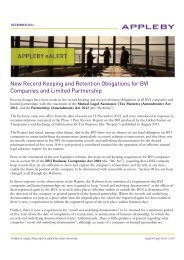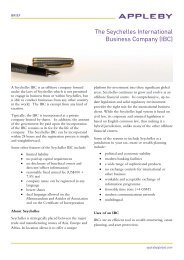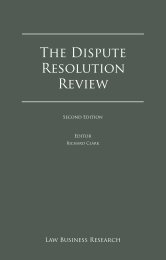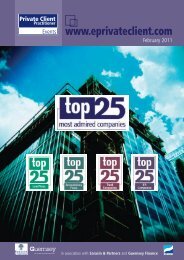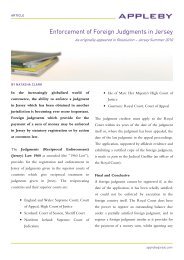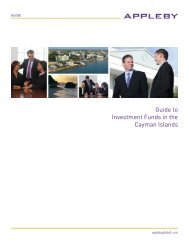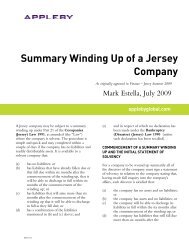ISLE OF MAN 2011 - Appleby
ISLE OF MAN 2011 - Appleby
ISLE OF MAN 2011 - Appleby
Create successful ePaper yourself
Turn your PDF publications into a flip-book with our unique Google optimized e-Paper software.
HFMWEEK<br />
S P E C I A L R E P O R T<br />
I S L E O F M A N <strong>2011</strong><br />
DISTRIBUTED WITH HFMWEEK<br />
COMPLIANCE<br />
The potential effect and impact of the<br />
AIFM Directive<br />
PROTECTION<br />
How the Isle of Man is meeting rising<br />
standards of regulation<br />
REPUTATION<br />
An international financial services centre<br />
with top quality fund services<br />
FEATURING Active Group // <strong>Appleby</strong> // Caledonian Fund Services //<br />
Charlemagne Capital // Fund Management Association // Financial<br />
Supervision Commission // PricewaterhouseCoopers // Tufton Oceanic
I s l e o f M a n 2 0 1 1<br />
Offshore fund direcTOrs – no<br />
more dodging and Weavering<br />
Simon Harding, partner in the Isle of Man office of <strong>Appleby</strong> and local head of the funds team, considers the<br />
ramifications of an interesting legal decision in the Cayman Islands<br />
Simon Harding<br />
is the team leader for the<br />
funds at <strong>Appleby</strong>’s Isle of<br />
Man office. He worked<br />
as a solicitor in Glasgow,<br />
after which he returned<br />
to the island in 2000 as<br />
an associate with Cains,<br />
before joining the firm<br />
and becoming partner<br />
in 2005.<br />
The dust has still to settle following the storm<br />
created by the decision of the Grant Court<br />
of the Cayman Islands in Weavering Macro<br />
Fixed Income Fund Limited (In Liquidation)<br />
v. Peterson and Ekstrom (August <strong>2011</strong>)<br />
(Weavering), but it would be unwise for fund<br />
directors in the Isle of Man to assume that the decision of<br />
a court of first instance on the other side of the Atlantic<br />
concerning events in Sweden can be ignored.<br />
Weavering dealt with unusually unambiguous facts<br />
and, seemingly, fairly clear-cut evidence. Essentially, the<br />
finding of the court was that the directors of this typically<br />
structured Cayman hedge fund had acted in a fashion<br />
representing almost a caricature of the supine non-executive<br />
director. A complete abdication of their supervisory<br />
responsibilities meant they had failed to expose that<br />
a high proportion of the assets on its balance sheet were<br />
fictitious – illusions created by the investment manager.<br />
Had they discharged these responsibilities, subsequent<br />
redemptions on the basis of an inflated NAV would not<br />
have been paid.<br />
The high degree of interest generated<br />
by Weavering seems to arise<br />
from a couple of factors. First, the<br />
finding of personal liability against<br />
each director to the tune of $111m;<br />
this figure certainly has a headlinegrabbing<br />
quality. Second, the trial<br />
judge took the opportunity to conduct<br />
a tour d’horizon of the legal<br />
implications of the typical offshore<br />
hedge fund structure for directors,<br />
and to make extensive comments<br />
about the manner in which a director<br />
might go about discharging the<br />
resulting duties.<br />
Given the finding that the directors<br />
had completely ignored<br />
(rather than fallen short of the<br />
required standard in the performance<br />
of) their duties of care and skill, such comments<br />
were probably not strictly necessary and thus not technically<br />
part of the decision. There are, of course, many<br />
decisions of higher courts or greater persuasive authority<br />
on the discharge of directors’ duties, and those of<br />
non-executive directors specifically; this judgement,<br />
however, addresses them in the very particular scenario<br />
of the offshore hedge fund constituted with industry<br />
standard contractual documents.<br />
Before the courts of<br />
the Isle of Man, the<br />
judgment certainly<br />
would not have the<br />
weight of a decision of<br />
the higher courts in<br />
England<br />
”<br />
At the time of writing, no appeal has been intimated;<br />
nor do the terms of the judgement (save perhaps as to<br />
the calculation of damages) brook much argument. Thus<br />
it could be that the judge’s comments in Weavering gain<br />
considerable currency in the offshore world by reason of<br />
their specificity and topicality.<br />
Before the courts of the Isle of Man, the judgement<br />
certainly would not have the weight of a decision of the<br />
higher courts in England (which are of high persuasive authority<br />
and to be followed in the absence of countervailing<br />
local considerations). But in the absence of such scenariospecific<br />
authority from weightier sources, the comments<br />
would certainly be treated as useful guidance.<br />
Irrespective of the technical status of the judgement,<br />
Weavering may well give sustenance to fund liquidators.<br />
The encouragement afforded by this decision may tip the<br />
balance in cases where insolvency officials are wavering as<br />
to the merits of instigating proceedings against allegedly<br />
delinquent directors. Especially where there could be recourse<br />
to a D&O policy.<br />
In addition, there is the strong possibility that these<br />
developments will influence the<br />
thinking of regulators. Professional<br />
directors operating in the<br />
Isle of Man are generally required<br />
to be licensed to do so by the Isle<br />
of Man Financial Supervision<br />
Commission; the Commission<br />
follows legal trends as closely as<br />
the private sector and these developments<br />
may influence its officers’<br />
approach to supervision, enforcement<br />
and critical decisions (such<br />
as whether or not to institute disqualification<br />
proceedings).<br />
So, what does the decision in<br />
Weavering mean for fund directors<br />
in the Isle of Man And are<br />
there any steps they should be taking<br />
to ensure that they are meeting<br />
the standards that would, on the basis of this judgement,<br />
now be expected of them – and to demonstrate that they<br />
are doing so No one active in the sector could pretend<br />
that this was an unforeseeable development. AIMA’s<br />
‘Offshore Alternative Fund Director’s Guide’ should be<br />
required reading for all such individuals. Taken with the<br />
comments in Weavering, one could use this to produce a<br />
forbiddingly long list of dos and don’ts, but the following<br />
points emerge with prominence from the case:<br />
1 4 h f m w e e k . co m
L e g a l<br />
• Appointment – A director does not have to<br />
be an expert in the relevant trading strategy,<br />
but he needs to have enough financial awareness<br />
to review and interpret financial statements;<br />
and the time and resources to perform<br />
their role. While Weavering focused on duties<br />
of care and skill, fiduciary duties are also<br />
non-negotiable; actual and potential conflicts<br />
need identification, careful consideration and<br />
ongoing management.<br />
• Fund establishment – As well as having a<br />
clear understanding of the commercial terms<br />
of the proposed fund and its consistency with<br />
industry norms and ensuring full disclosure<br />
of material facts and deviations in the offering documents,<br />
fund directors need a detailed understanding<br />
of which functionaries are responsible for what activities.<br />
In Weavering, there was a failure to ensure that<br />
adherence to investment restrictions was monitored<br />
properly – or at all.<br />
• Ongoing operations – Regular and substantive board<br />
meetings with proper scrutiny of financial information<br />
are essential and a real dialogue between the board<br />
and all key service providers is almost a pre-condition<br />
Service providers need<br />
to be required to<br />
report to the board<br />
and to be held to<br />
account by the board<br />
”<br />
to this occurring. Services providers need to be<br />
required to report to the board and to be held to<br />
account by the board in order to ensure the board<br />
discharges its supervisory role. Real records of the<br />
board’s activities need to be maintained.<br />
• Audit – The directors need a clear understanding<br />
of the audit process and their role and responsibilities<br />
in relation to it.<br />
• Significant developments – The judge in<br />
Weavering thought it significant that the market<br />
turbulence occasioned by the collapse of Lehman<br />
appeared to have no effect whatsoever on the<br />
smooth progress of the board. This was the curious<br />
incident of the dog in the night-time: if they<br />
had been doing their job properly, this would have<br />
been a major event. The lesson is that in times of crisis,<br />
the board must not rely on service providers and<br />
must act to preserve the interests of the fund – and<br />
be seen to do so.<br />
Directors who already take their responsibilities seriously<br />
should not be panicked by Weavering, but it is a<br />
timely reminder of the dangers of complacency, and of<br />
the need to avoid a one-size-fits-all ‘tick-box’ approach to<br />
directorships. n<br />
h f m w e e k . co m 15


